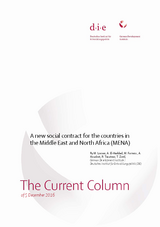The Current Column
A new social contract for the countries in the Middle East and North Africa (MENA)
Loewe, Markus / Amirah El-Haddad / Mark Furness / Annabelle Houdret / Bernhard Trautner / Tina ZintlThe Current Column (2016)
Bonn: German Development Institute / Deutsches Institut für Entwicklungspolitik (DIE) (The Current Column of 5 December 2016)
Bonn, 5 December 2016. The 2011 upheavals that became known as the ‘Arab Spring’ proved that MENA countries were much more fragile than many observers had expected. Even Western governments who criticized the lack of democracy in MENA countries pointed out that they were at least politically stable. A major goal of their development co-operation was to preserve this stability. But much of what they did targeted short-term rather than long-term stability because it helped MENA countries maintaining the ‘old social contract’ rather than designing a ‘new social contract’ that would bring about more comprehensive political, economic and social reforms. Such a ‘new social contract’ could, for example, provide for more socio-economic justice and transparency in government procedures and decisions, and thereby generate more long-term political stability.
What are social contracts? Basically, they are explicit or implicit agreements between the groups that make up a society and the government defining their respective rights, expectations and obligations towards each other. Such agreements exist in all countries of the world. They are respected by all parties as long as they are broadly understood and accepted, although sometimes they survive because people are afraid that renegotiating the contract could worsen their situation. Sometimes, governments or societies break the terms of a social contract unilaterally by upheaval, revolution, coup d’état, repressive acts, or measures that undermine basic living standards, and they try to replace it with a different social contract.
The old social contracts of MENA countries were based on external rent income from oil, gas, gold and phosphate exports, geo-strategic rents (such as Suez Canal user fees for Egypt), remittances and development co-operation. The contracts stipulated the distribution of income to citizens through the provision of government jobs, subsidies, transfers, free health care and education, housing and privileges as compensation for the lack of political participation and transparency in politics, administration and the judiciary. But with growing populations and declining state revenues, governments became less able to fulfil their contractual obligations and had to focus spending increasingly on strategically important social groups. Citizens still had no real voice in politics, which finally drove them to the streets calling for "Bread! Freedom! Social justice!" in the 2011 Arab uprisings.
Since then, only Tunisia has seriously started the quest for a new, more sustainable social contract. Syria, Yemen and Libya have descended into civil wars, which will not end unless all relevant conflicting parties agree on a new social contract. Even worse, through refugee flows and sectarian cleavages, these conflicts negatively affect the social contracts of neighbouring countries as well. Most MENA countries continue to rely on the ‘old social contract’: They are still ruled by the old-style authoritarian regimes: a king, a state-party or the army. In the short run, these states may be stable but in the longer run many risk imploding because their fundamental problems remain unsolved. Political repression has increased, not decreased – and this with the tacit approval of some Western governments. MENA governments have proved unable to deliver on human development. If they fail to offer a new social contract soon a new wave of revolts, revolutions and civil wars across the region is likely. At the same time, MENA societies have to enter into the bargaining process. Renunciation of ‘the system’ has not sufficed to bring about change since the so-called Arab Spring.
The tragedy is that many donor countries continue to support the old social contracts as well. They provide MENA governments with generous loans and transfers, rather than offering support for the design and implementation of new social contracts. In the long-term, however, MENA and Western governments have a common interest in new social contracts. If MENA governments continue to resist transparency and political participation while also failing to provide more economic growth and social equality, citizens are likely to rebel again. Millions of people could try to flee their imploding countries, many of them towards Europe.
Of course, it is unrealistic to hope that the authoritarian regimes and modernising societies in the MENA region will resolve their deeply rooted problems over night, and ‘regime change’ from the outside does not work. But Arab regimes can do much more to fight corruption, improve the accountability of public administration and the judiciary, strengthen the quality of public services (especially education and health), and increase efficiency and equity in taxation and public spending.
Western countries that remain committed to liberal democracy can no longer be concerned with how to ‘stabilise’ existing political order in the MENA region, because it will collapse sooner or later under the pressure of societal change if no reforms take place. Instead, development partners in the true sense of the word should ask how they can help MENA countries in designing new, more sustainable social contracts that work better for citizens and for governments as well.







